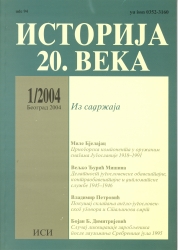Crnogorska komponenta u oružanim snagama Jugoslavije 1918–1991
A Montenegrin Component in the Armed Forces of Yugoslavia 1918-1991
Author(s): Mile BjelajacSubject(s): History
Published by: Institut za savremenu istoriju, Beograd
Keywords: Montenegro; Montenegrin component; Yugoslav army; Serbia; 1918–1991
Summary/Abstract: This paper has an aim to clarify historical prospective and position of Montenegrin component within mutual Yugoslav armed forces established after 1918. One can follow their position in the period of the Kingdom, in Yugoslav Homeland Army (general Mihailovitch) or in Partisan Liberation Movement (1941–1945), and in Yugoslav Peoples Army. In contrast to some old fashion myths and recent misleading interpretations in scholar literature, we offered systematic, verified data on distant and recent history. We laid out that in time „Montenegrin questing“ was not considered as a „national question“, at least not before World War Two. Serbia and Montenegro had been viewed as „two Serbian Kingdoms“ even by ultimate Montenegrin monarch Nikola the 1st. Two countries and two Officer corps had close cooperation in 1878, 1912–13 and 1914–1916. Since 1914 Serbian Ministry of Finance financed not only Serbian but Montenegrin army, too. The career officers of Montenegrin origin were accepted in new Officer corps in full extent (some 550). Predominantly Serbian, new military authorities let to Montenegrins themselves to establish list for the rank and promotions. New king Alexander 1st, the grandson of Montenegrin king Nikola, did everything in his power to avoid any gesture that could offend Montenegrin sensitivity and vanity. Especially he emphasized on equal treatment of all local Montenegrin tribes (promotions, decorations, admition into the Royal Guard etc.). Poor country and warrior tradition led many of Montenegrins in military schools. But young officers took opposite sides in the national uprising in 1941. Majority sided, actually led National forces that acknowledged general Mihailovic as supreme commander, minority were communist oriented. When that war turned into civil one they became bitter rivals. In Partisan led movement several of the former officers obtained the highest posts like chief of the Staff, deputy of the Chief and several Army commanders. In the mid of the 1950s Montenegrins, now acknowledged as a „nation“ constituted almost one third of the General corps and 10.8 percent of the Officer corps. Their share steadily declined in 1970s (19.3 % Generals) and 1980s (11.1% Generals and 5.28% officers). But in the same time Montenegrins as a nation were only 2.58 percent of Yugoslav population after census.
Journal: Istorija 20. veka
- Issue Year: 2004
- Issue No: 1
- Page Range: 9-21
- Page Count: 12
- Language: Serbian

